
Listen to My Story 'Bout TV Theme Songs
Netflix pioneered video streaming during the 2000s. Did they also kill the TV theme song?
My favorite part about writing this newsletter is all of the people that I get to meet. Producers. Executives. Record collectors. I also get to meet many great writers. One of my favorites is Kevin Alexander from the newsletter On Repeat. From evocative retrospectives to riveting discussions, On Repeat is a one-stop-shop for audiophiles. Click here to subscribe.
Since Kevin has turned me on to so much great music over the last few months, I asked him to recommend two songs for my newsletter this week. But before we get to his recommendations, I want to talk about the evolution of some criminally underrated compositions: television theme songs.
When Everybody Knew The Words
I’m not good at relaxing. But I try to chill out on Sunday nights. I pour myself a cup of tea, lay on the couch, and throw on an old sitcom. This past week, I put on The Fresh Prince of Bel-Air. Within moments my relaxed state dissipated. It had nothing to do with the sitcom, though. It had to do with the streaming service I was using, Max (née HBO Max).
When you boot up a show on Max, a little button appears in the bottom right corner of the screen that allows you to skip the intro, or theme song. Who could possibly be skipping The Fresh Prince of Bel-Air theme song? Any person that is jumping past DJ Jazzy Jeff and the Fresh Prince’s humorous minute of music should have their head checkout out.
Netflix pioneered the “Skip Intro” button in 2017. In a five year retrospective of the feature, Cameron Johnson, a Director of Product Innovation, noted, “On Netflix in a typical day, the Skip Intro button is pressed 136 million times, saving members an astonishing 195 years in cumulative time!” This level of usage made me question if I should be the one undergoing a cranial exam.
According to Johnson, the featured was created because of a practical issue: “[Netflix] found that in about 15% of the time members were manually advancing the series within the first five minutes.” Rather than having their users haphazardly scrub through a show, they tested adding a button to let them advance to the perfect spot just as the intro ended. Since then, most other streaming services have rolled out a similar feature. Though some composers have complained about it, it has been popular with users.
Studying the history of the “Skip Intro” button made me curious about the evolution of television intros, or theme songs. What’s interesting is that in the same sense that the “Skip Intro” button was created to solve a practical issue, the television theme song was also created to solve a practical issue.
To understand the TV theme song, you first must look to the radio. “Many of television’s earliest series,” Jon Burlingame writes in his book Music for Prime Time: A History of American Television Themes and Scoring, “simply moved over from radio … Making the transition were many of the same actors and producers - and, often, the music.”
In the radio days, these themes had a simple purpose: to let the person at home know what was coming on. The Lone Ranger, a popular western that made the jump from radio to TV, illustrates this idea. You hear the stately horns along with the hooves of a charging horse before the bellowing narrator intones, “A fiery horse with the speed of light, a cloud of dust and a hearty, 'Hi Yo Silver!' The Lone Ranger!” In 20 seconds, there’s no confusing which program you’re about to enjoy. This was vital when there weren’t many great ways to figure out what you were currently watching.
The music behind the narrator is the William Tell Overture, composed by Gioachino Rossini in the 1820s. In fact, much of the theme music on radio and early television was “canned”, or pre-recorded with no particular program in mind. The use of canned music soon lost favor to original compositions. In the ensuring decades, these compositions began to fall into five broad categories.
Lyrical Backstory Theme
When Sherwood Schwartz pitched Gilligan’s Island - a show about a storm stranding a group on an uncharted isle in the Pacific - he was met with pushback from CBS president James Aubrey. The show required too much exposition. If someone tuned in for the first time, they’d have no idea why these people were stuck on an island. Schwartz came up with a solution: incorporate the backstory into the theme song, “a song,” as recounted in Music for Prime Time, “that will tell the audience, in 60 seconds, why they’re there, how they got there, and so forth.”
Providing the lyrical backstory in the theme was a great way to orient audiences for shows like The Beverly Hillbillies, The Brady Bunch, and The Nanny where the premise might not have been obvious to a new viewer. Composers have gotten away from these themes over the last few decades. There’s less of a reason to listen to The Fresh Prince of Bel-Air’s lyrical backstory when you can quickly pull up a video preview or written premise of the program.
Lyrical Abstract Theme
Related to the lyrical backstory, the lyrical abstract also sets up the show but not as explicitly. These are popular in shows whose premise is a bit simpler, like The Mary Tyler Moore Show, The Big Bang Theory, and Friends. It should be noted that lyrical theme songs of any ilk are more common in comedies than dramas.
Instrumental Theme
As noted earlier with The Lone Ranger, instrumental themes have been with television since its inception, but they quickly evolved into being original rather than canned compositions. Though instrumentals are sometimes used in comedies, like The Andy Griffin Show and Seinfeld, they are much more common in action shows and dramas. In many ways, an instrumental can set the mood for a program just as vividly as a lyrical song. Take the theme from the classic police procedural Dragnet as an example.
First airing on the radio in 1949, the long-running cop drama was as associated with its ominous instrumental theme as it was with Jack Webb, the show’s star. From Hawaii Five-0 to ER to Games of Thrones, instrumental themes have remained prevalent in television.
Cover Theme
When The Golden Girls - the story of four older women sharing a home in Miami - began airing on NBC in 1985, it used a cover of Andrew Gold’s 1978 hit “Thank You for Being a Friend” for its theme.
This didn’t seem like a radical choice. It played the role of lyrical abstract. But at the time, covers were not popular choices for theme songs. They’ve become more widespread in the years since. Married... with Children used Frank Sinatra’s “Love & Marriage” to introduce the show. CSI used The Who’s “Who Are You”. The Sopranos used Alabama 3’s “Woke Up This Morning”. Netflix’s Big Mouth currently uses Charles Bradley’s “Changes”.
Micro-, Nondescript-, and Non-Themes
At a network press conference in 1994, ABC Entertainment president Ted Harbert said that he had asked producers to cut musical themes from their shows. His reasoning was as follows:
It gives the audience an opportunity to take the little remote and zap around. We really have to find ways to stop them from doing that. The 60-second, or in some cases 90-second main title that they see week after week, given all the choices they have, just doesn’t make sense to me anymore.
Just as early television producers were solving a practical problem by introducing themes and Netflix was doing the same by letting viewers skip them, Harbert saw himself as solving a problem. With the expansion of cable and the proliferation of remote controls, it was easier than ever for a viewer to change the channel if a show didn’t get right to the action.
In the ensuing decades, we’ve seen hit shows like Lost and Breaking Bad almost completely eschew the theme song. We’ve also seen reality shows, like Keeping Up with the Kardashians, with themes so nondescript that you almost wouldn’t notice that there’s music playing.
If the options of cable television were enough to make Ted Harbert balk at the idea of theme songs, then streaming and the internet must have killed them, right?
There’s no need to explain the premise of a show to a viewer. They can just read about it on the screen.
It’s not desirable to make a show so complex that it needs a ton of exposition. There are so many ways for a person to entertain themselves these days that a Gilligan’s Island-esque theme song will have them scrolling on TikTok or Instagram.
Even if you have a theme song that people like, they’re going to binge watch your show anyway. Nobody needs to hear the same ditty 22 times in eight hours.
The evidence is mixed, though. From GQ to NPR to The Wall Street Journal, publications have bemoaned the death of the theme song while also noting that streaming - the force behind the infamous “Skip Intro” button - has given theme songs a second life. I wanted to find out if we could quantify any of those claims.
To sort this out, I grabbed all 1300+ shows on Wikipedia’s “List of television theme music”. I then tossed out sporting events, news, gameshows, talk shows, reality shows, and variety shows, so I was mostly left with sitcoms, dramas, and children’s programming. After wrangling the data, we see that there was a dearth of notable themes during the 1950s, or the era of the canned theme. Notable themes grew rapidly during the 1960s and 1970s when the original theme song became ubiquitous. The number of notable themes then remains steady through the 2000s before falling off a cliff in the 2010s.
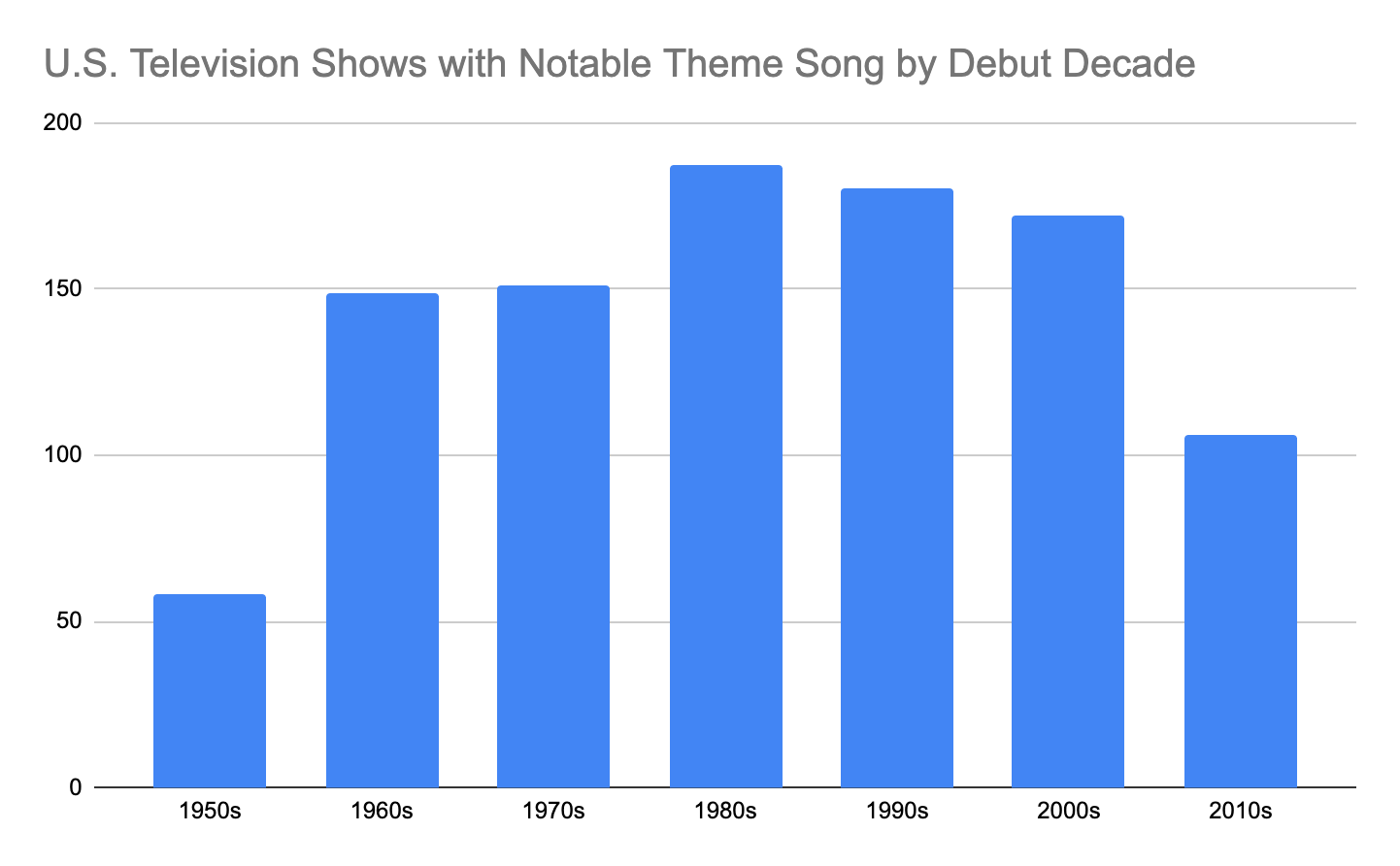
But I soon realized that there were other dynamics at play here. The same number of shows don’t debut in each decade. Maybe earlier decades had an advantage. Luckily, we can check. Wikipedia also maintains lists of television debuts in each year (e.g., 1971). When we aggregate those lists, we see that there are a record number of television shows debuting currently. This makes sense. In the 1950s, there were just a few channels. Now, there are thousands, along with scores of streaming services.
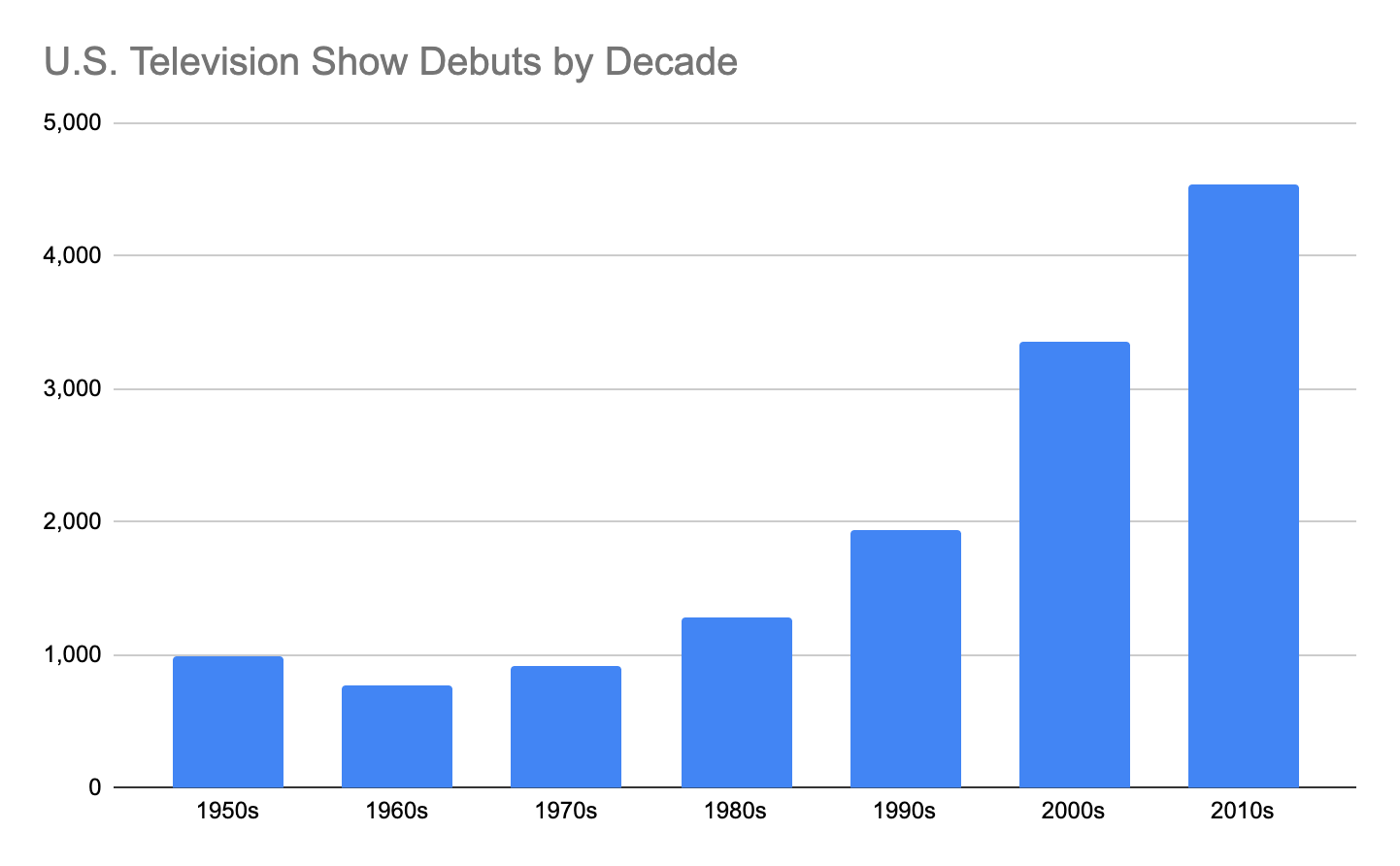
But there’s one more quandary to resolve. Many of the shows created since the year 2000 are of the talk and reality variety. If we exclude those, maybe there are more themes for sitcoms, dramas, and children’s shows on a relative basis even though they’ve declined in aggregate. Again, this is not the case. On both the relative and aggregate basis, we are seeing fewer television shows with notable theme songs.

Even though there are fewer themes, it’s possible that those that are around are more engaging than ever before. In the twice-mentioned Music for Prime Time, Jon Burlingame writes, “Curiously, producers working for the non-broadcast entities seemed to pay more attention the role and power of music.”
We can get a sense of this too. In 2022, Rolling Stone released a list of “The 100 Greatest TV Theme Songs of All Time”. If more shows on this list debuted recently, then there might be credence to the theory that though there are fewer theme songs that the ones that are around are quite good.
If we’re to trust Rolling Stone, the golden age of TV theme songs was the 1970s, with nearly 25% of the top 100 coming from that decade. But despite there being fewer theme songs post-2000, there have still been some great ones. Another quarter come from the 2000s and 2010s. In short, though the TV theme song seems to be on the decline, there are some worth celebrating among those that remain.
When I started researching this topic, I thought of TV theme songs as silly jingles. By the time I finished, my thinking had changed. TV themes should be studied as seriously as any other form of popular music. For decades, musicians have thought about them that way. Respected composers, like John Williams, got their start in television. Popular songwriters, like John Sebastian, managed to reach even larger audiences by writing themes. Music for the small screen deserves as much respect as music for the movies, radio, and symphony hall.
Kevin Alexander Picks a Song from an Old TV Show
"Winter" by The Rolling Stones
Featured in Cold Case
Sometimes, a TV theme is a perfect fit for the scene creators are trying to pull you into. Barney Miller’s opening song sets the table for the gritty, funky environment the show operates in. Other times, they transcend the show they’re made for and become their own defining legacy. You might struggle to remember a single plot point of Hawaii Five-0, but it only takes a few notes of the song to conjure up images of Diamond Head, big waves, and hulu dancers.
CBS’s 2000s’ police procedural Cold Case bet the other way with its theme song. Its superpower is that it could have fit dozens of primetime dramas that have run in the last 25 years. Rather than using the theme to paint a picture, the show uses music throughout each episode to do it.
The show revolves around a team of tough Philly homicide investigators working on cold cases. The kicker is that the music for any given episode is from the year the crime they’re investigating took place. It’s subtle, and once you figure it out, it feels like you’re in on the a secret.
For the last episode, music supervisor Jenée DeAngelis mixed things up and used only songs by The Rolling Stones. As the final montage plays out, we hear “Winter” by the band. The deep cut is a perfect fit for a show that appeals as much to music fans as crime buffs.
Kevin Alexander Picks a Song from a New TV Show
"Strange Currencies" by R.E.M.
Featured in The Bear
The aforementioned Cold Case ended in 2010. In 2023, can you name a theme song from a show that debuted in the last five years? I can’t. I even went and looked some up. No dice. At the time, Cold Case’s featureless theme was an exception. In hindsight, it feels like precedent. Recent shows like The Bear have taken the ball and run with it.
The show deftly works in tracks to color the drama. The show follows Carmy, Richie, and Fak, each articulating a different “Chicago guy” stereotype. Through the show, Richie and Carmy evolve from 2D caricatures into fully developed humans. (The jury’s still out on Fak). And again, the music, like R.E.M.’s “Strange Currencies”, facilitates this. This track is from 1994 but was given new life in an episode of the show, used to help color a plot turn.
Looking to hear more from Kevin Alexander, the man that recommended those two songs? Subscribe to his newsletter On Repeat.
Want to dig into my TV data? Have at it.


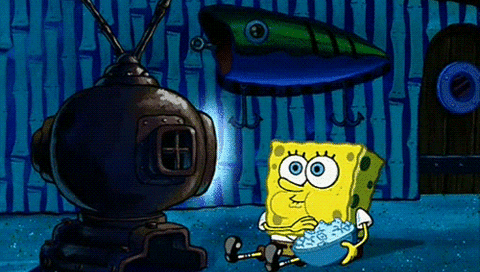


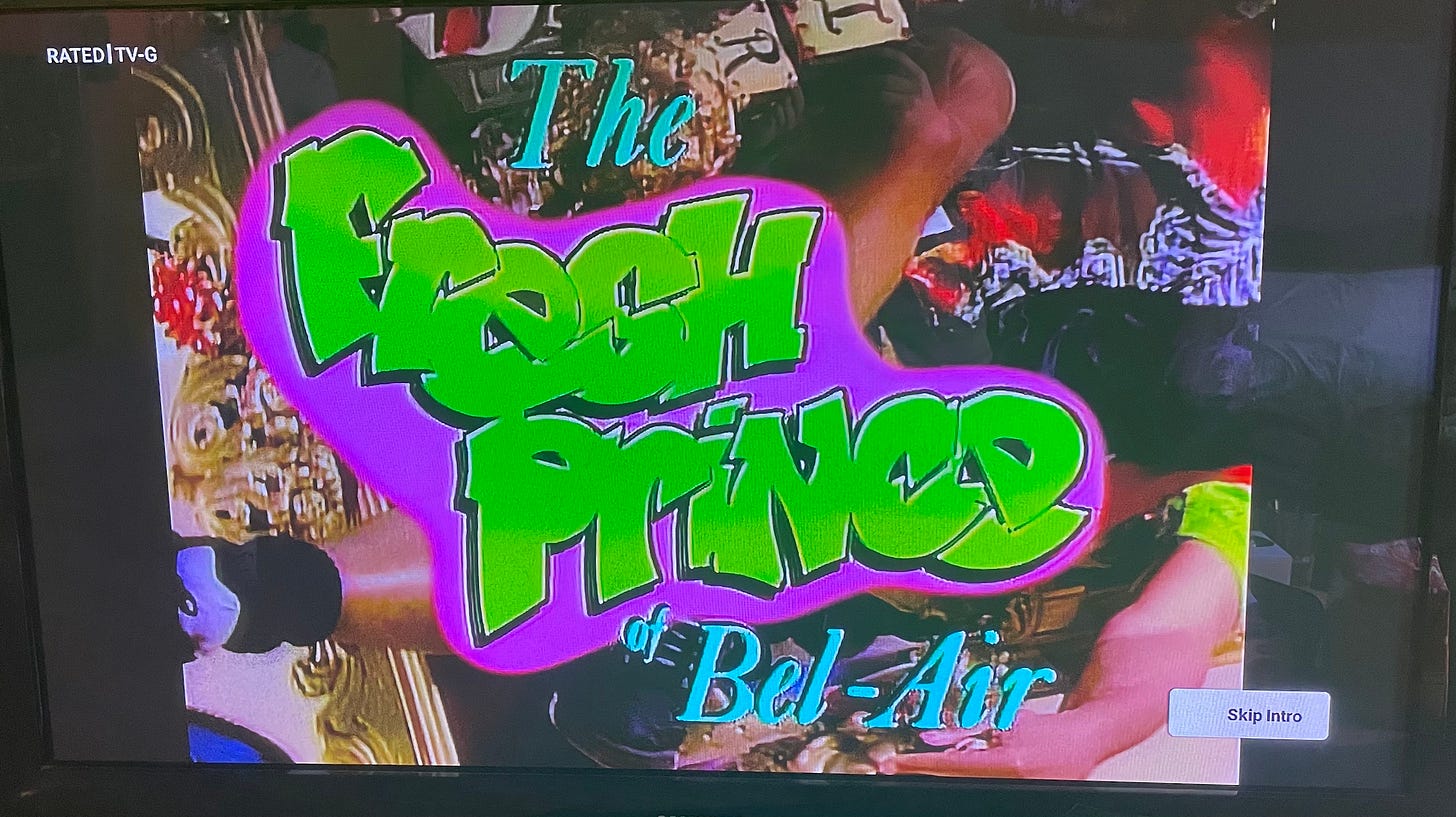
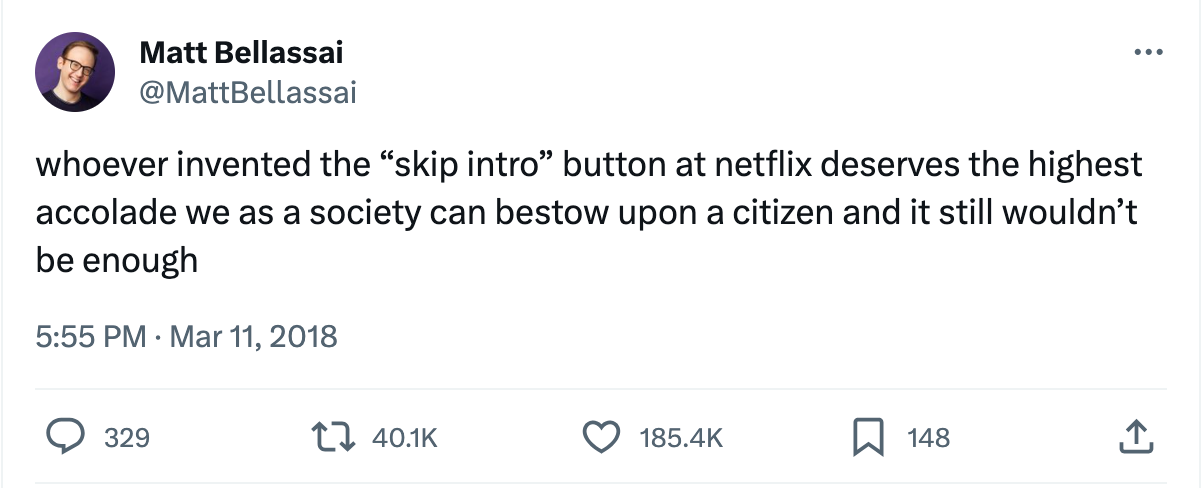

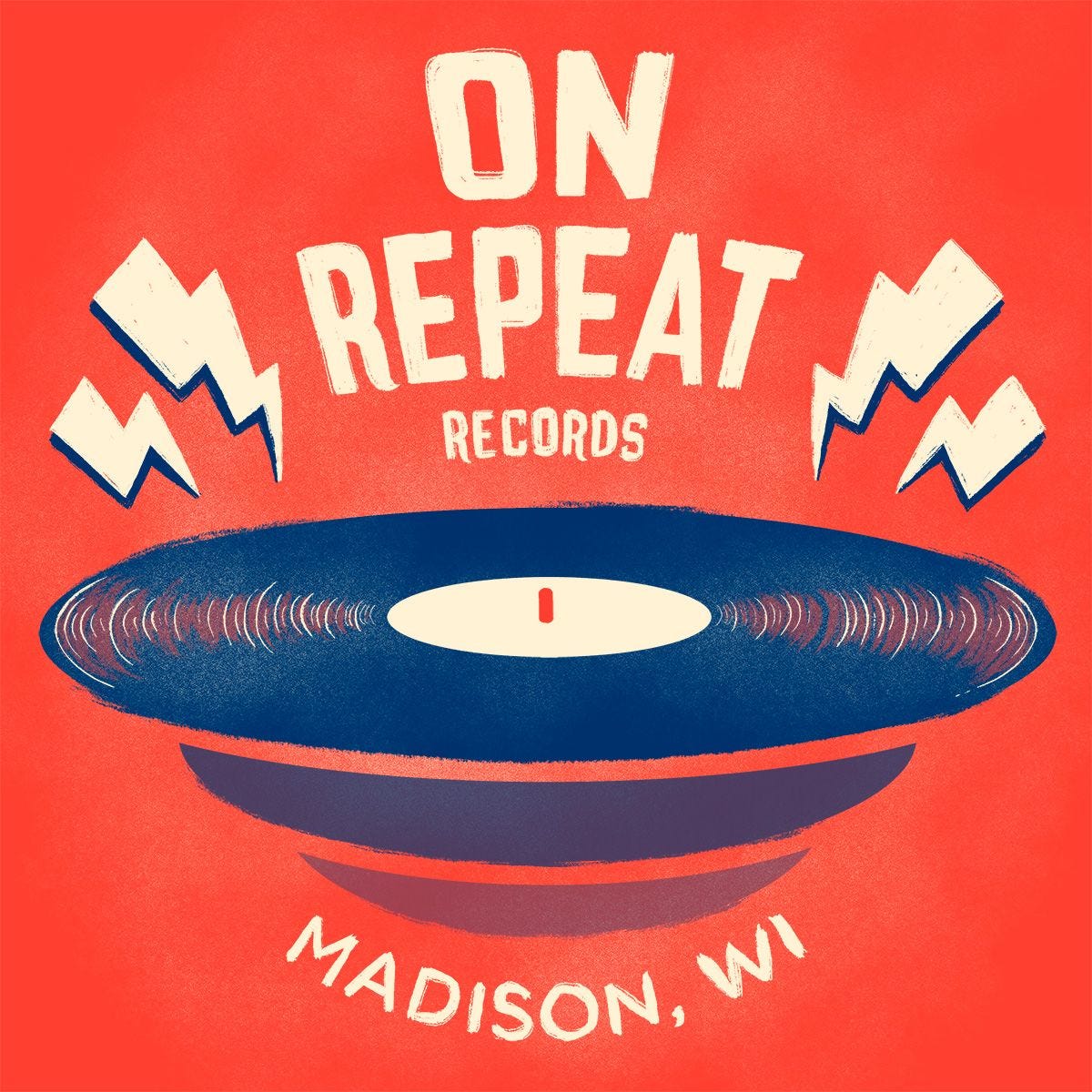






Great piece, Chris. Thanks for the link to the Guardian piece. I loved the Succession theme- it put me in the right frame of mind for what I was about to watch. My sister, Ann Hampton Callaway wrote and sang the lead vocal for the theme to The Nanny. ( I sang backup vocals) Whenever she (or we) sing it live in concert it’s amazing the response from the audience- everyone knows the words! Those iconic theme songs connect us. It’s a shame to skip them.
If Hill Street Blues was streaming on Netflix, the skip button wouldn't be of much use anymore: who can resist this legendary tune by Mike Post https://youtu.be/pThIeuKD6uM?si=OoeYf6sfwxuG-hK4